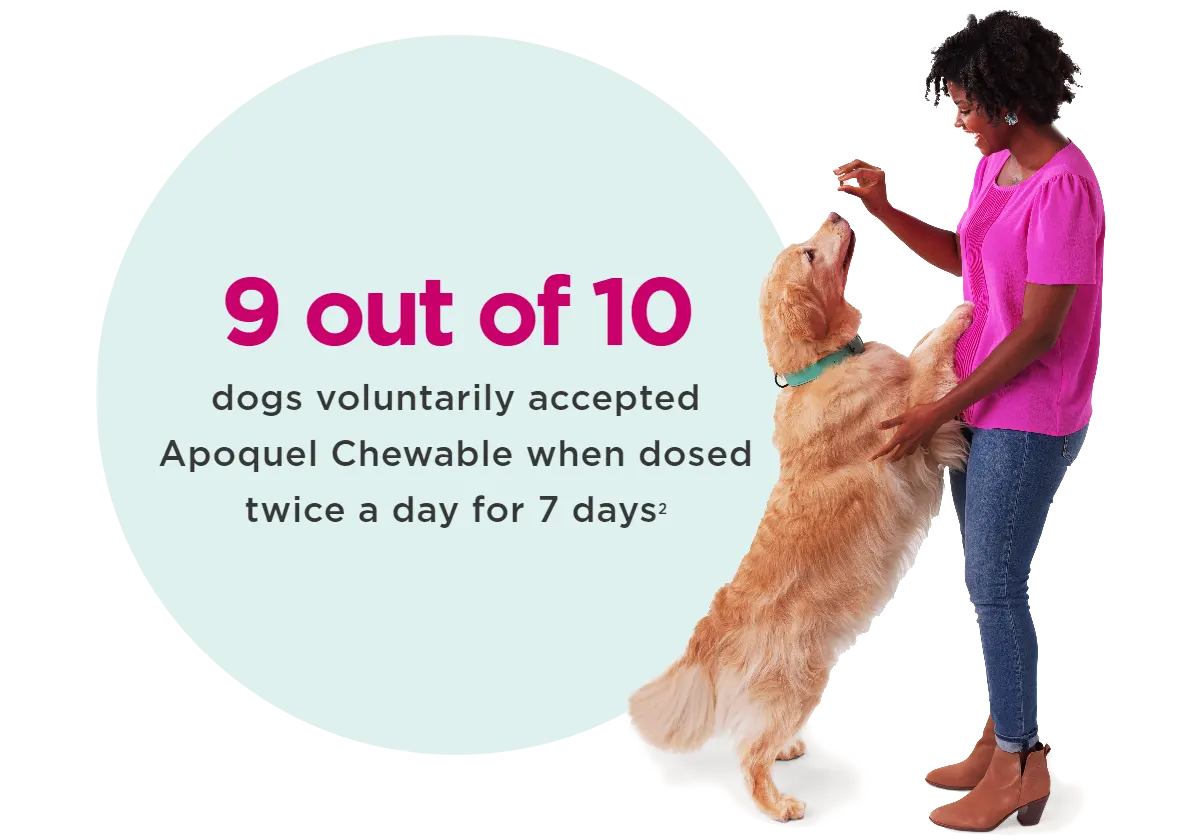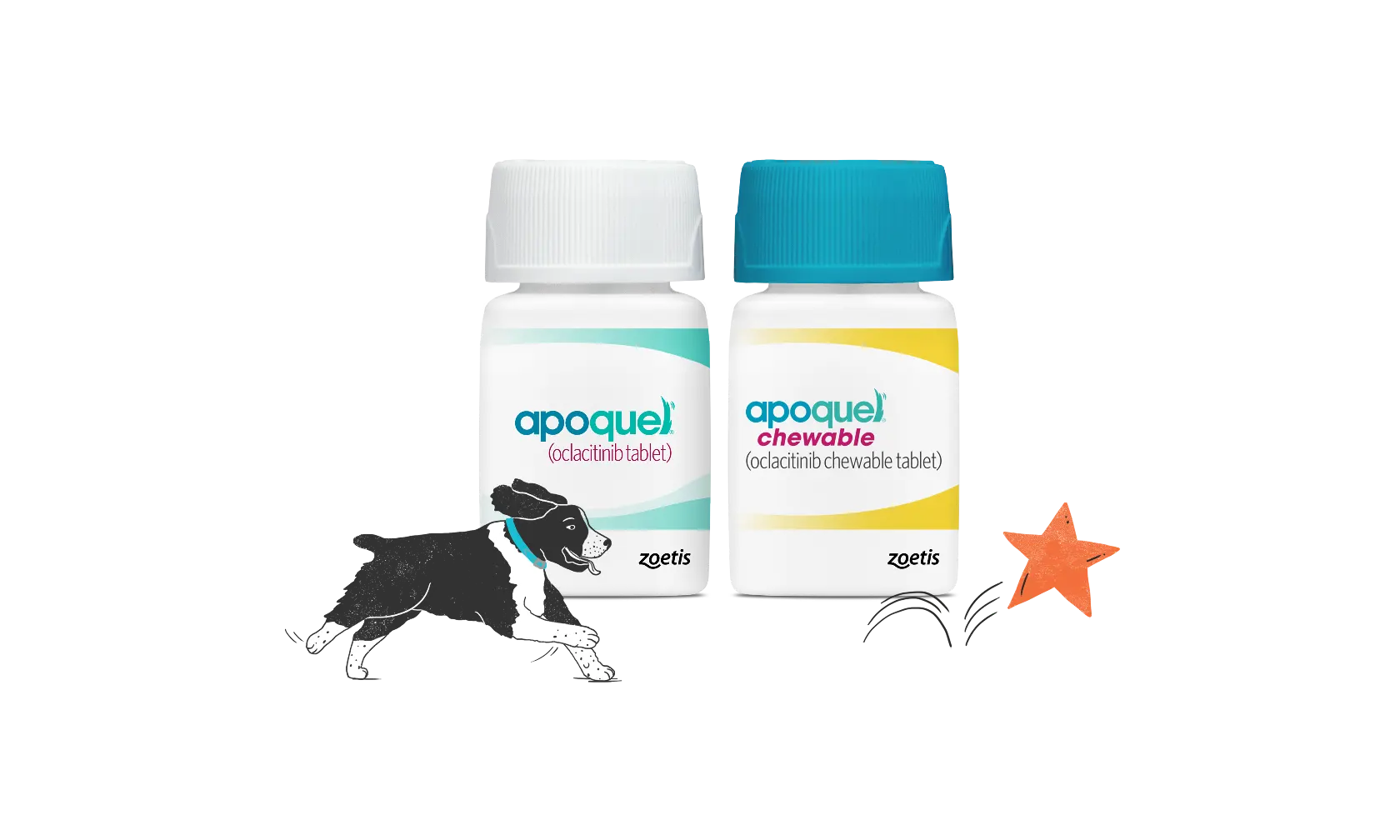
Fast-acting Allergic Itch Relief
In a Tasty Chewable

Why Apoquel Chewable?



*Based on a model study for flea allergic dermatitis.
†No specific studies have been conducted to compare the PK of Apoquel Chewable when administered with or without food. The active ingredient in Apoquel Chewable has been shown to be unaffected by food.
The First and Only Chewable Treatment for the Relief of Allergic Itch in Dogs
With a treat-like formulation, it may simplify dosing and help eliminate the stress from giving pills.

Struggling with Giving Pills?
Ask your vet if Apoquel Chewable could be right for your dog. It's easy to give and comes in 3 strengths to suit your dog’s body weight.


Control Allergic Itch & Earn Up To $80 in Rewards
Join our free pet health Rewards program. Spend your Rewards on products and services at the vet!

Frequently Asked Questions
In a study, 65% of dog owners indicated that they had difficulty administering conventional tablets to their dog and 70% of dog owners given the product profiles of Apoquel Chewable and Apoquel® Tablet preferred the chewable over a tablet.4 Apoquel Chewable is expected to have comparable efficacy to Apoquel tablet after the first dose, and comparable safety to Apoquel tablet5,6 - and it's in a convenient chewable form. This could lead to increased compliance, particularly among dogs that are difficult to pill.
Apoquel Chewable can be used at the same time as many other medications,3 including nonsteroidal anti-inflammatory drugs (NSAIDs), anti-infectives, parasiticides, antifungals and allergen-specific immunotherapy.3
The use of Apoquel Chewable in combination with glucocorticoids, cyclosporine or other systemic immunosuppressive agents has not been evaluated. For dogs receiving these medications, pet owners should consult with their veterinarian prior to adding Apoquel Chewable to their dog’s treatment regimen.
No. Apoquel Chewable is indicated only for the control of pruritus (itching) associated with allergic dermatitis (skin allergies) and control of atopic dermatitis (environmental allergies) in dogs at least 12 months of age. Apoquel Chewable is not approved to treat other clinical signs or diseases of dogs.
You can give another dose of Apoquel Chewable if your dog spits out the entire chewable. If you are unsure of how much of the chewable your dog swallowed or if only part of the dose was spit out, do not give another dose. Wait to give the chewable at the next scheduled time.
Yes, just like with Apoquel tablet, you should wash your hands immediately after handling Apoquel Chewable.
While you can transition from one product to another, you will want to keep your dog on only one of the products regularly. Talk with your vet about the best way to transition from Apoquel Tablet to Apoquel Chewable or Apoquel Chewable to Apoquel Tablet.
You will need to get a new prescription for Apoquel Chewable from your veterinarian to get the chewable formulation, even if your dog is already on Apoquel Tablet. You cannot use your Apoquel Tablet prescription to get Apoquel Chewable.
Food allergies in dogs are not very common and having a pork allergy in dogs is even less common. It is thought that approximately 2% of dogs with food allergies have an allergy to pork.7
IMPORTANT SAFETY INFORMATION: See full Prescribing Information. Do not use Apoquel or Apoquel Chewable in dogs less than 12 months of age or those with serious infections. Apoquel and Apoquel Chewable may increase the chances of developing serious infections, and may cause existing parasitic skin infestations or pre-existing cancers to get worse. Consider the risks and benefits of treatment in dogs with a history of recurrence of these conditions. New neoplastic conditions (benign and malignant) were observed in clinical studies and post-approval. Apoquel and Apoquel Chewable have not been tested in dogs receiving some medications including some commonly used to treat skin conditions such as corticosteroids and cyclosporines. Do not use in breeding, pregnant, or lactating dogs. Most common side effects are vomiting and diarrhea. Apoquel and Apoquel Chewable have been used safely with many common medications including parasiticides, antibiotics and vaccines.
INDICATIONS: Control of pruritus (itching) associated with allergic dermatitis and control of atopic dermatitis in dogs at least 12 months of age.
References:
-
Data on file, Study Report A161C-US-21-C02, 2022, Zoetis Inc.
-
Visser M, Walsh K, King V et al. Acceptance of oclacitinib maleate (Apoquel®) chewable tablets in client‑owned dogs with allergic and atopic dermatitis. BMC Veterinary Research 2022; 18:103.) One hundred and twenty-one (121 ) dogs with 1673 total dose administrations successfully completed the study and were included in the data summary.
-
Data on file, TI-09920. ZMR: Adelphi/PROVE Pet Owner Preferences for Pill vs Treat All Markets WTP Survey Results March 2023.
-
Data on file, TI-09986, Zoetis Inc., 2022.
-
Data on file, TI-09776, Zoetis Inc., June 2023.
-
Cosgrove SB, Cleaver DM, King VL, et al. Long-term compassionate use of oclacitinib in dogs with atopic and allergic skin disease: safety, efficacy and quality of life. Vet Dermatol. 2015;26(3):171-179, e35. doi: 10.1111/vde.12194.
-
Mueller R, Olivry T, Prélaud P. Critically appraised topic on adverse food reactions of companion animals (2): common food allergen sources in dogs and cats. BMC Veterinary Research [serial online]. 2016;12(9):(12 January 2016). doi:10.1186/s12917-016-0633-8


